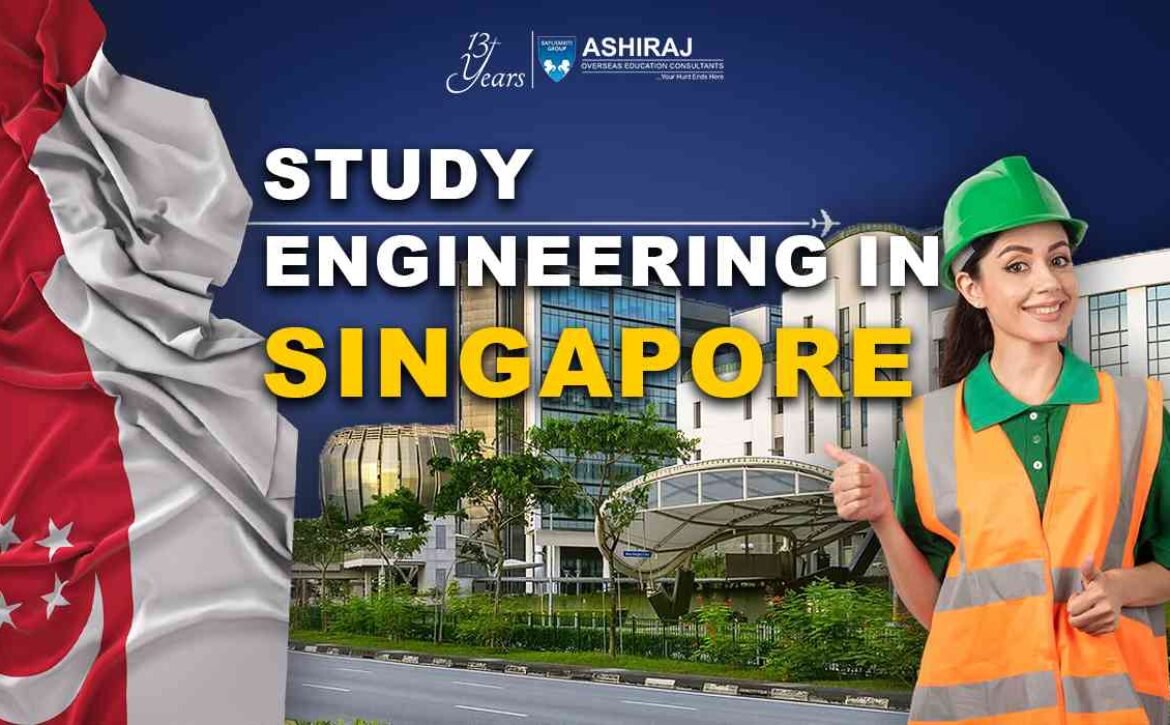
Engineering in Singapore
Engineering in Singapore is a thriving sector that embodies innovation, precision, and forward-thinking solutions. Renowned for its cutting-edge infrastructure and commitment to excellence, Singapore stands as a beacon of technological advancement in Southeast Asia. The island nation’s strategic location, robust education system, and supportive government policies have cultivated a dynamic engineering ecosystem that drives progress across various industries.
From towering skyscrapers to intricate transportation networks, engineering in Singapore encompasses a wide spectrum of disciplines, including civil, mechanical, electrical, and biomedical engineering. The nation’s emphasis on research and development has propelled it to the forefront of emerging technologies such as artificial intelligence, sustainable energy, and smart infrastructure. With world-class facilities and a talented workforce, Singapore continues to attract global investment and collaborations, reinforcing its position as a hub for engineering excellence. As Singapore navigates the challenges of the 21st century, its engineering prowess remains integral to shaping a sustainable and prosperous future for future generations. Engineering in Singapore reflects the nation’s unwavering commitment to innovation, efficiency, and progress.
Why to Study Engineering in Singapore?
- Global Recognition: Engineering programs in Singapore are internationally recognized, ensuring that graduates receive credentials that hold weight worldwide.
- Cutting-edge Facilities: Singapore boasts state-of-the-art facilities and laboratories, providing students with hands-on experience and exposure to the latest technologies.
- Diverse Specializations: From aerospace to biomedical engineering, Singapore offers a wide array of engineering specializations, allowing students to tailor their studies to their interests and career goals.
- Strong Industry Connections: The engineering sector in Singapore maintains strong ties with industry leaders, offering students opportunities for internships, research projects, and networking.
- Multicultural Environment: Singapore’s multicultural society fosters a rich learning environment where students interact with peers from diverse backgrounds, preparing them for the global workforce.
- Supportive Government Policies: The Singaporean government prioritizes education and innovation, offering scholarships, grants, and incentives to support engineering students and researchers.
- Thriving Economy: Singapore’s robust economy provides ample job opportunities for engineering graduates, with sectors such as technology, construction, and manufacturing experiencing steady growth.
- Quality of Life: With its modern infrastructure, safety, and vibrant culture, Singapore offers a high quality of life for students pursuing engineering studies.
Studying engineering in Singapore offers a unique blend of academic excellence, industry exposure, and global opportunities, making it an attractive destination for aspiring engineers seeking a world-class education.
Top Universities to Study Engineering in Singapore
University | QS World University Rankings 2023 | Type of University | Average Annual Fees | Programs Offered |
National University of Singapore (NUS) | 11th | Public | SGD 28,000 – SGD 38,000 | Civil Engineering, Mechanical Engineering, Electrical Engineering, Computer Engineering |
Nanyang Technological University (NTU) | 13th | Public | SGD 24,000 – SGD 36,000 | Aerospace Engineering, Bioengineering, Chemical Engineering, Environmental Engineering |
Singapore Institute of Technology (SIT) | Not ranked | Public | SGD 20,000 – SGD 28,000 | Infocomm Technology, Electrical Power Engineering, Sustainable Infrastructure Engineering |
Singapore University of Technology and Design (SUTD) | 51-100 | Public | SGD 26,000 – SGD 34,000 | Engineering Systems and Design, Engineering Product Development, Information Systems Technology |
Singapore Management University (SMU) | Not ranked | Private | SGD 40,000 – SGD 50,000 | Bachelor of Science in Computer Science and Smart Systems (double degree) |
Engineering in Singapore offers a diverse range of educational opportunities at top-tier institutions. The National University of Singapore (NUS) and Nanyang Technological University (NTU) consistently rank among the world’s top engineering universities, offering programs in various disciplines such as civil, mechanical, and electrical engineering. Additionally, the Singapore Institute of Technology (SIT) and Singapore University of Technology and Design (SUTD) provide innovative programs focusing on sustainable infrastructure and engineering systems. For students seeking a private institution, Singapore Management University (SMU) offers specialized programs in computer science and smart systems. With affordable average annual fees and access to cutting-edge facilities, these universities in Singapore provide an exceptional environment for aspiring engineers to thrive and contribute to the dynamic field of engineering.
Course Curriculum for Engineering in Singapore
- Core Engineering Modules: Students delve into core subjects like mathematics, physics, and chemistry, laying the groundwork for advanced engineering concepts.
- Specialized Tracks: Engineering programs offer specialized tracks such as civil, mechanical, electrical, and computer engineering, allowing students to focus on their areas of interest.
- Hands-on Learning: Practical sessions, laboratory work, and projects form an integral part of the curriculum, providing students with real-world experience and problem-solving skills.
- Interdisciplinary Approach: Many programs adopt an interdisciplinary approach, integrating aspects of technology, innovation, and sustainability into the curriculum to address contemporary challenges.
- Industry-Relevant Skills: Emphasis is placed on developing industry-relevant skills such as critical thinking, teamwork, and communication, preparing students for the demands of the engineering profession.
- Internship Opportunities: Students have opportunities for internships with leading engineering firms and research institutions, allowing them to gain practical experience and build professional networks.
- Research and Innovation: Engineering programs encourage research and innovation, fostering a culture of creativity and entrepreneurship among students.
The course curriculum of engineering in Singapore reflects the nation’s commitment to excellence and innovation, equipping graduates with the skills and knowledge to excel in diverse engineering fields. Engineering in Singapore emphasizes practical learning, interdisciplinary approaches, and industry relevance, preparing students to tackle global engineering challenges effectively.
Eligibility Criteria & Admission Requirements for Engineering in Singapore
- IELTS or TOEFL Scores:
IELTS: Minimum score of 6.5 overall
TOEFL: Minimum score of 90 (iBT)
- GRE or GMAT Scores:
GRE: Verbal – 150, Quantitative – 160
GMAT: Minimum score of 650
- Passport & Student Visa:
Valid passport with at least 6 months validity
Student visa obtained through the Singaporean embassy or consulate in your home country
- Academic Certificates:
Completion of secondary education with satisfactory grades
Bachelor’s degree in relevant field for postgraduate studies
- Work Experience:
Some programs may require relevant work experience, particularly for postgraduate studies
Work experience in engineering or related fields can strengthen your application
Engineering in Singapore requires applicants to meet certain eligibility criteria to ensure academic preparedness and English language proficiency. IELTS or TOEFL scores demonstrate proficiency in English, while GRE or GMAT scores assess analytical and quantitative abilities. Valid passport and student visa are necessary for international students to study in Singapore. Academic certificates, including secondary education transcripts and relevant bachelor’s degrees, are essential for admission consideration. Additionally, relevant work experience can enhance an applicant’s profile, especially for postgraduate programs. Adhering to these eligibility criteria is crucial for aspiring engineers seeking to pursue their education in Singapore.
Documents Required for Studying Engineering in Singapore
- Passport: A valid passport with at least 6 months validity from the intended date of entry into Singapore.
- Two Letters of Recommendation (LOR): Letters from academic or professional references attesting to the applicant’s qualifications and character.
- Statement of Purpose (SOP): A concise essay outlining the applicant’s academic and career goals, as well as reasons for choosing engineering in Singapore.
- Curriculum Vitae (CV): A detailed resume highlighting academic achievements, extracurricular activities, and relevant work experience.
- Official High School Transcripts: Transcripts reflecting academic performance in secondary education, including grades and coursework.
- Educational Certificates: Certificates of completion or graduation from previous educational institutions, including diplomas or degrees.
- Work Experience Certificate: If applicable, a certificate verifying any relevant work experience in engineering or related fields.
- Proof of Financial Resources: Documentation demonstrating the applicant’s ability to cover tuition fees, living expenses, and other costs associated with studying and living in Singapore.
Engineering in Singapore requires applicants to submit a comprehensive set of documents to support their application for admission to academic programs. These documents help assess the applicant’s academic background, qualifications, and suitability for the chosen engineering program. It is essential to ensure that all required documents are accurately prepared and submitted within the specified deadlines to facilitate a smooth application process.
Admission Process for Engineering in Singapore
- Research and Choose Universities: Explore engineering programs offered by universities in Singapore. Consider factors such as rankings, specializations, and campus facilities.
- Check Eligibility Criteria: Review admission requirements including academic qualifications, English proficiency tests (IELTS or TOEFL), and standardized test scores (GRE or GMAT).
- Prepare Required Documents: Gather necessary documents such as transcripts, certificates, letters of recommendation (LOR), statement of purpose (SOP), CV, passport, and proof of financial resources.
- Submit Online Application: Complete the university’s online application form accurately and submit it along with required documents before the deadline.
- Pay Application Fees: Pay the application fees as specified by the university.
- Wait for Admission Decision: Universities will review applications and notify applicants of their admission status. This process may take several weeks to months.
- Acceptance and Visa Application: Upon receiving an offer of admission, accept the offer and proceed with the student visa application process.
- Arrival and Orientation: Upon obtaining the student visa, plan your arrival in Singapore and attend the university’s orientation program.
- Commence Engineering Studies: Begin your engineering studies in Singapore, familiarize yourself with the curriculum, and engage in academic and extracurricular activities.
Following these steps diligently ensures a smooth admission process for engineering programs in Singapore, setting the foundation for a rewarding academic journey. Engineering in Singapore offers excellent opportunities for students to excel and contribute to the field’s advancement.
“Education is the most powerful weapon which you can use to change the world.”
Nelson Mandela
Cost of Engineering Course in Singapore
- Tuition Fees: Tuition fees for engineering programs in Singapore vary depending on the university and level of study. On average, undergraduate tuition fees range from SGD 25,000 to SGD 40,000 per year, while postgraduate programs may cost between SGD 30,000 to SGD 50,000 per year.
- Accommodation: The cost of accommodation in Singapore can be significant. Students have various options, including university dormitories, private rental apartments, or shared accommodation. Monthly rent can range from SGD 600 to SGD 2,500, depending on the type and location of the accommodation.
- Living Expenses: Singapore is known for its high standard of living. Students should budget for expenses such as food, transportation, utilities, and personal necessities. On average, monthly living expenses can range from SGD 800 to SGD 1,500, depending on lifestyle choices and spending habits.
- Books and Supplies: Additional expenses include textbooks, stationery, and academic supplies. Students should budget approximately SGD 500 to SGD 1,000 per year for these materials.
- Health Insurance: International students are required to have health insurance coverage during their stay in Singapore. The cost of health insurance varies but typically ranges from SGD 500 to SGD 1,000 per year.
Understanding the cost of studying engineering in Singapore is essential for prospective students to plan their finances accordingly. Scholarships, grants, and part-time work opportunities may help alleviate some of the financial burdens associated with pursuing an engineering education in Singapore. Engineering in Singapore offers excellent academic opportunities, but students should be prepared for the associated costs of living and studying in the country.
Scholarships for Engineering Courses in Singapore
Scholarship Name | Amount | Application Deadline |
ASTAR Graduate Scholarship | Full tuition fees + Stipend for living expenses | Varies (typically March to May) |
Singapore International Graduate Award (SINGA) | Full tuition fees + Monthly stipend of SGD 2,000 to SGD 2,500 | December to January |
NUS Undergraduate Scholarship | Full tuition fees + Living allowance | Varies (typically March to May) |
NTU President’s Graduate Scholarship | Full tuition fees + Monthly stipend | Varies (typically December to February) |
SUTD President’s Graduate Fellowship | Full tuition fees + Monthly stipend | Varies (typically November to January) |
Scholarships for engineering in Singapore provide financial assistance and recognition of academic excellence for deserving students. ASTAR Graduate Scholarship and SINGA offer full tuition coverage along with generous stipends for living expenses. The NUS Undergraduate Scholarship and NTU President’s Graduate Scholarship cover full tuition fees with additional living allowances. Application deadlines for these scholarships vary, but typically fall between November and May, allowing students ample time to prepare and submit their applications. The SUTD President’s Graduate Fellowship also provides full tuition coverage and a monthly stipend, with application deadlines typically between November and January. Engineering in Singapore becomes more accessible and financially feasible for students through these scholarships, empowering them to pursue their academic and career aspirations without financial constraints.
Career Opportunities After Engineering in Singapore
Job Profile | Average Salary (SGD) |
Mechanical Engineer | 60,000 – 90,000 |
Civil Engineer | 65,000 – 100,000 |
Electrical Engineer | 70,000 – 110,000 |
Software Engineer | 70,000 – 120,000 |
Aerospace Engineer | 75,000 – 130,000 |
Engineering in Singapore offers diverse and lucrative career opportunities across various industries. Mechanical engineers play vital roles in designing, testing, and manufacturing machinery, with average salaries ranging from SGD 60,000 to SGD 90,000 per year. Civil engineers are involved in infrastructure projects, earning salaries between SGD 65,000 to SGD 100,000 annually. Electrical engineers, specializing in power systems and electronics, earn salaries ranging from SGD 70,000 to SGD 110,000. Software engineers, in high demand due to the tech industry’s growth, earn salaries between SGD 70,000 to SGD 120,000. Aerospace engineers, contributing to Singapore’s aerospace sector, command salaries from SGD 75,000 to SGD 130,000. With Singapore’s robust economy and emphasis on innovation, engineering professionals can expect rewarding career paths and competitive salaries. Pursuing engineering in Singapore opens doors to diverse and fulfilling career opportunities, offering financial stability and professional growth in dynamic industries.
Frequently Asked Questions About Engineering in Singapore
National University of Singapore (NUS) and Nanyang Technological University (NTU) consistently rank among the top engineering universities in Singapore.
Yes, several scholarships, such as ASTAR Graduate Scholarship and NUS Undergraduate Scholarship, are available for engineering students in Singapore.
The average cost ranges from SGD 25,000 to SGD 40,000 per year for undergraduate programs and SGD 30,000 to SGD 50,000 per year for postgraduate programs.
Eligibility criteria typically include academic qualifications, English proficiency (IELTS or TOEFL), and standardized test scores (GRE or GMAT).
Work experience is not always mandatory but can strengthen your application, especially for postgraduate engineering programs.
International students can apply for a student visa through the Singaporean embassy or consulate in their home country after receiving an offer of admission.
Popular specializations include civil engineering, mechanical engineering, electrical engineering, aerospace engineering, and software engineering.
Yes, international students in Singapore can work part-time during the term and full-time during scheduled breaks with proper authorization.
Engineering graduates in Singapore have a positive job outlook, with opportunities in various sectors, including technology, construction, and manufacturing.
Yes, many engineering programs in Singapore are offered in English to accommodate international students, ensuring a language-friendly learning environment.




